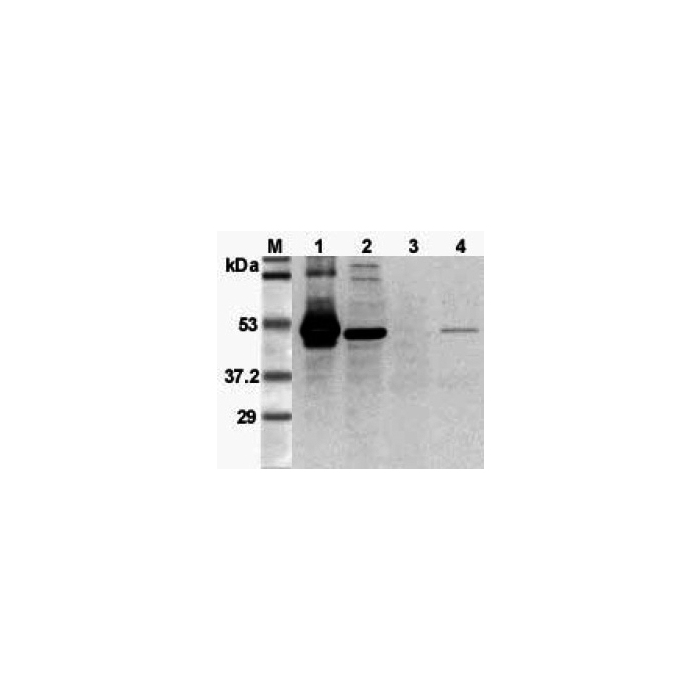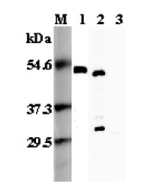Cookie Policy: This site uses cookies to improve your experience. You can find out more about our use of cookies in our Privacy Policy. By continuing to browse this site you agree to our use of cookies.
AdipoGen Life Sciences
anti-FOXP3 (mouse), pAb
As low as
390
CHF
CHF 390.00
In stock
Only %1 left
AG-25A-0020-C100100 µgCHF 390.00

Figure 1: Western blot analysis using anti-FOXP3 (mouse), pAb (Prod. No. AG-25A-0020) at 1:3'000 dilution.
1: Mouse FOXP3 (His-tagged).
2: Transfected mouse FOXP3 cell lysate (HEK 293).
3: Mouse T lymphocyte (CD4+) cell lysate.
4: PHA treated mouse T cell (CD4+) cell lysate.
1: Mouse FOXP3 (His-tagged).
2: Transfected mouse FOXP3 cell lysate (HEK 293).
3: Mouse T lymphocyte (CD4+) cell lysate.
4: PHA treated mouse T cell (CD4+) cell lysate.
| Product Details | |
|---|---|
| Synonyms | Forkhead Box Protein P3; Scurfin |
| Product Type | Polyclonal Antibody |
| Properties | |
| Source/Host | Rat |
| Immunogen/Antigen | Recombinant mouse FOXP3. |
| Application |
ELISA: (direct and indirect: 1:2’000-1:10’000) Western Blot: (1:2’000-1:5'000 using ECL. Suggested blocking and dilution buffer is TBST containing 0.05% Tween 20 and 5% skim milk. Suggested incubation time is 1 hour at room temperature). Optimal conditions must be determined individually for each application. |
| Crossreactivity | Mouse |
| Specificity | Recognizes mouse FOXP3. Detects a band of ~46-49kDa by Western blot. |
| Purity Detail | Protein A-affinity purified. |
| Concentration | 1mg/ml |
| Formulation | Liquid. 0.2μm-filtered solution in PBS, pH 7.4. Contains no preservatives. |
| Shipping and Handling | |
| Shipping | BLUE ICE |
| Short Term Storage | +4°C |
| Long Term Storage | -20°C |
| Handling Advice |
After opening, prepare aliquots and store at -20°C. Avoid freeze/thaw cycles. |
| Use/Stability | Stable for at least 6 months after receipt when stored at -20°C. |
| Documents | |
| MSDS |
 Download PDF Download PDF |
| Product Specification Sheet | |
| Datasheet |
 Download PDF Download PDF |
Description
FOXP3 is involved in immune system responses. It functions as the master regulator in the development and function of regulatory T cells. FOX proteins belong to the forkhead/winged-helix family of transcriptional regulators and are presumed to exert control via similar DNA binding interactions during transcription. Defects in FOXP3 are the cause of immunodeficiency polyendocrinopathy, enteropathy, X-linked syndrome (IPEX); also known as X-linked autoimmunity-immunodeficiency syndrome. IPEX is characterized by neonatal onset insulin-dependent diabetes mellitus, infections, secretory diarrhea, trombocytopenia, anemia and eczema.






